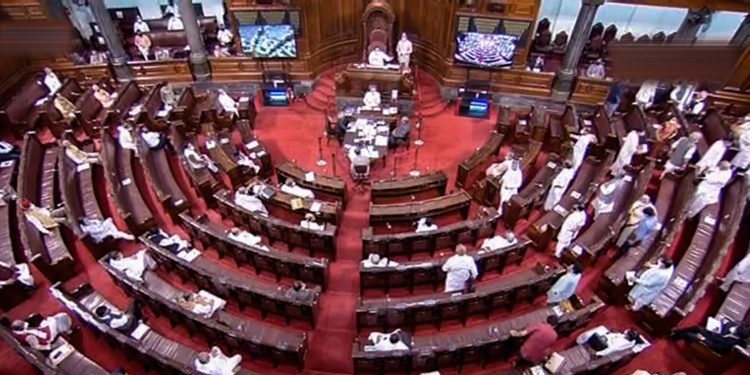New Delhi: Lok Sabha members Tuesday urged the government to revisit the Collegium system to appoint Supreme Court and high court judges. They also flagged the high pendency of cases and vacancies in the judiciary. The members were participating in a debate to amend two laws for bringing clarity on when Supreme Court and High Court judges will get enhanced pension on attaining a certain age. Some members also said there was a need to increase the retirement age of High Court judges and bring it on a par with the retirement age of Supreme Court judges. As of now, high court judges retire at 62 years and Supreme Court judges at 65 years of age. Law Minister Kiren Rijiju is likely to reply to the debate Wednesday.
Initiating the debate on the High Court and Supreme Court Judges (Salaries and Conditions of Service) Amendment Bill, 2021, Congress member Shashi Tharoor expressed concern over the long pendency of court cases. He alleged there were examples of the judiciary’s ‘insensitivities’ including the rejection of several applications on the plight of migrant labourers during the Covid-19 period.
Tharoor said decisions have been pronounced one after the other which go beyond the question of separation of power between the executive and judiciary. He alleged that there is a concern of executive influence over the judiciary in cases related to abrogation of Article 370.
Pinaki Misra (BJD) said the bill seeks to nullify judgments of two high courts that have been upheld by the Supreme Court. He urged the government to reconsider the move saying it should not be ‘churlish’. Misra said the bill on creating a National Judicial Appointments Commission (NJAC) should be brought back with certain changes. The law, passed by a massive majority by Parliament, was struck down by the top court.
RSP member N K Premachandran supported Misra saying Parliament should not invalidate the order of the Supreme Court on such an issue which deals with the pension of retired judges who have attained the age of 80 years.
Former Union Minister of State for Law and BJP member PP Choudhury urged the government to ‘revisit’ the Collegium system to appoint members of the higher judiciary. “I request the government to revisit the collegium system…And the original spirit and object of Article 124 is required to be restored,” he said. Before 1993, when judges were appointed by the executive, one cannot say they delivered poor judgements, added Choudhury.
Backing the bill, Choudhury said that remuneration of judges – whether of Supreme Court or High Court – in the country is less than that in other nations.
The Law Minister, he said, is not accountable to Parliament with respect to the appointment of high court and Supreme Court judges. “Where we are having parliamentary democracy, all the ministers are accountable. But it is very difficult to hold the law minister accountable because he has no role to play. ‘He has no role to fill the vacancies available in the high court and the Supreme Court judges,” Choudhury pointed out. He also pushed for an All India Judicial Service on lines of IAS and IPS to appoint judges of subordinate courts.
Dayanidhi Maran (DMK), in an apparent reference to post-retirement jobs, called for having a cooling off period for judges. He said two former chief justices of India were ‘demoted’ – one was appointed as a governor and the other became a Rajya Sabha member. Maran asserted that the retirement age of judges should also be increased.
Raising the issue of pendency, Kalyan Banerjee (Trinamool Congress) stated that justice delayed is justice denied. “Across all the courts in India, as on September 15, 2021, 4.5 crore cases were pending. In the last two years, India has added 23 cases every minute to the pendency list,” Banerjee pointed out. Collegium, he said, is the administrative act and ‘I have the right to criticise every administrative act’.
Members of the JD(U) and BJD were also critical of the Collegium system.






































